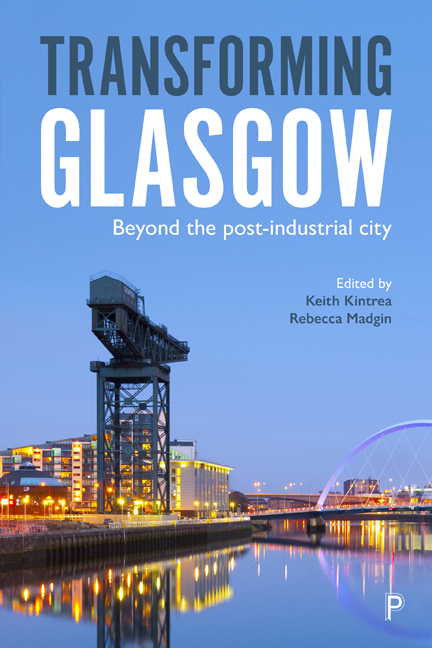Book contents
- Frontmatter
- Contents
- List of Maps, Tables, Figures and Boxes
- Notes on Contributors
- Acknowledgements
- Foreword
- Map
- Introduction: Transforming Post-Industrial Glasgow – Moving Beyond the Epic and the Toxic
- PART I
- PART II
- PART III
- Conclusion: Beyond the Post-Industrial – Narratives of Time and Place
- Index
Conclusion: Beyond the Post-Industrial – Narratives of Time and Place
Published online by Cambridge University Press: 25 March 2021
- Frontmatter
- Contents
- List of Maps, Tables, Figures and Boxes
- Notes on Contributors
- Acknowledgements
- Foreword
- Map
- Introduction: Transforming Post-Industrial Glasgow – Moving Beyond the Epic and the Toxic
- PART I
- PART II
- PART III
- Conclusion: Beyond the Post-Industrial – Narratives of Time and Place
- Index
Summary
The post-industrial city is a set of emerging urban forms and functions that appears to be significantly different from the industrial city of the past two centuries to warrant separate definition. At the same time, it is not yet sufficiently articulated to justify a name and a nomenclature of its own that defines it in a manner other than as reaction to cities of the recent past. The use of ‘post-industrial’, then, represents both a sense on the part of observers that we have crossed a significant boundary, and that the precise nature of the terrain on the other side is still largely unknown.
(Shaw, 2001, p 284)Glasgow's transformation
The transformation of Glasgow, as depicted in the chapters in this book, is moving beyond characterisation as post-industrial. However, it still contains many elements that are attributable to the 20th century as the city was marked by economic decline, social deprivation and spatial divides against which urban policy largely failed to make much on an impression. But Glasgow, as the chapters demonstrate, is evidently not just a hollowed-out relic of industrialism. In the current century, its population has started to grow through the positive balance of migration and many key socio-economic indicators show that in measurable ways people in Glasgow are less deprived than they were, even if there is still some catching up to do with other cities. Glasgow sits in a relatively prosperous city-region of more than 1.5 million people (depending on which boundaries are chosen) and it is ranked approximately in the middle of the Globalization and World Cities Index for 2018 (Globalization and World Cities Research Network, 2019), which measures its business connections with 700 other cities around the world. Glasgow sits alongside regional cities in other developed countries such as Adelaide, Rotterdam and Osaka, ahead of some European capitals, although behind some other large UK regional cities, including Birmingham, Manchester and Edinburgh. However, Glasgow is not a city that has succumbed entirely to the full grip of neoliberal ‘austerity urbanism’. Certainly it is evident that its regeneration strategy has been shaped primarily to attract global capital, and it is enveloped within a deregulated financial system and flexible labour market like the rest of the UK.
- Type
- Chapter
- Information
- Transforming GlasgowBeyond the Post-Industrial City, pp. 279 - 294Publisher: Bristol University PressPrint publication year: 2019



